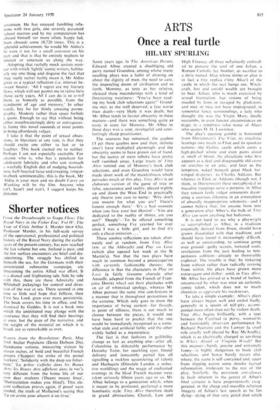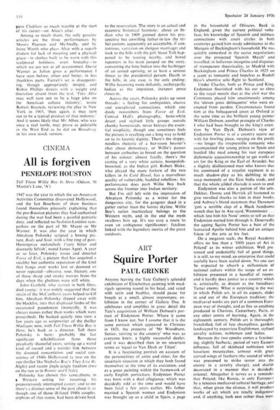ARTS Once a real turtle
HILARY SPURLING
Some years ago, in The American Dream, Edward Albee created a disobliging old
party named Grandma, among whose many needling ploys was a habit of droning on about the dignity of man, the need to care, the impending doom of civilisation and so forth. Mommy, as testy as her relative, silenced these maunderings with a kind of threatening weariness: 'You've been read- ing my book club selections again!' Grand- ma met, as she well deserved, a fate worse than death—very likely it was death, but Mr Albee tends to favour obscurity in these matters—and there was something quite as nasty in store for Mommy. Mr Albee in those days was a sow, revengeful and com- fortingly sharp practitioner.
The sourness has remained, the qualms (1 get these qualms now and then, definite
ones') have multiplied alarmingly and the obscurity seems to have grown out of hand, but the tactics of stern rebuke have pretty well vanished away. Large tracts of Tiny Alice remind one of Mommy's book club selections, and even Grandma would have made short work of the mawkishness which pervades much of this play. Tiny Alice is an elaborate version of the game of true or false, appearance and reality, played nightly up and down the West End in practically any theatre you care to name: 'Why don't you mourn for what you are? There's lament enough there'—`It's a bad moment when you face your last illusion'—'You are dedicated to the reality of things, are you not?' 'Deeply'—`To be offered something perfect, something I've yearned for ever since I was a little girl, and to find it's only a cheap imitation ... '
These sombre reflections are taken, alter- nately and at random, from Tiny Alice lase at the Aldwych) and Play on Love (which also opened last week at the St Martin's). Not that the two plays have much in common beyond a preoccupation with currently fashionable themes: the difference is that the characters in Play on Love (a fairly tiresome charade after Anouilh, adapted from the French of Fran- wise Dorin) wheel out their platitudes with an air of whimsical apology, whereas Mr Albee pursues the same trite conclusions in a manner that is throughout pretentious in the extreme. Which only goes to show the importance of being earnest—for though, in point of silliness, there is not much to choose between the pieces, it would not have been hard to predict that the one would be immediately recognised as a some- what stale and artificial fable: and the other widely hailed as a masterpiece.
The fact is that fashions in gullibility change as fast as anything else—after all, Columbine (a delectable performance by Dorothy Tutin, her sparkling eyes, limpid delivery and innocently parted lips all signalling a reckless squandering of talent) and Harlequin (Dinsdale Landen, a seduc- tive worldling) and the magic of enchanted evenings in the blasé French manner were taken seriously fifteen years ago or so. Mr Albee belongs to a generation which, when it meant to be profound, preferred a more bombastic style. Tiny Alice therefore deals in grand abstractions, Church, Law and
High Finance, all three nefariously embroil- ed to procure the soul of one Julian, a Roman Catholic lay brother, as sacrifice to a deity named Alice whose shrine or altar is in fact a tiny replica ('tiny Alice') of the castle in which the sect hangs out. Witch- craft, lust and untold wealth are brought to bear. Julian, who is much exercised by sexual frustration. has visions of being mauled by lions or ravaged by gladiators. and may or may not have impregnated, in somewhat fancy surroundings, a lady who thought she was the Virgin Mary. finally succumbs, in even fancier circumstances on stage, to a temptress (also name of Alice) who quotes D. H. Lawrence.
The play's opening gambit is borrowed from Diirrenmatt's The Visit, its ritualistic leanings owe much to Eliot and its spookier notions—the Gothic castle which emits a high-pitched whine and even pants aloud at smell of blood, the chatelaine who first appears as a deaf and disagreeable old crone on crutches in an attic, and later as the temptress, naked beneath great black hat- winged draperies- to Charles Addams. But whereas in Eliot or Addams (though not. I think, in Diirrenmatt) these metaphysical or macabre trappings serve a purpose, in Albee they remain fairly vulgar ornaments decor- ating a spurious dilemma in an atmosphere of absurdly inappropriate solemnity—and I cannot believe that, for anyone born into a generation after Albee's, the bulk of Tiny Alice can seem anything but ludicrous.
It is not hard to see why a playwright as accomplished as Albee, in a tradition essentially derived from Ibsen, should have grown dissatisfied with that tradition; and should have found it increasingly difficult. as well as unrewarding, to continue going over ground—guilty secrets, tortured souls, revelations from the past leading to tem- pestuous collision—already so thoroughly explored. The trouble is that, by tinkering from without rather than radically revising from within, his plays have grown more extravagant and duller: until, in Tiny Alice, Mr Albee has arrived at a brand of bathos, uncorrected by what was once an authentic comic talent, which does not so much eliminate as aggravate his weaknesses.
To take a simple example: Albee's plays have always begun well and ended badly, generally in a spasm of self-pity, accom- panied more often than not by violent death. Tiny Alice begins brilliantly, with a spat between the Cardinal (a pursy, womanish and formidably observant performance by Richard Pearson) and the Lawyer (a cruel role cruelly well played by Ray McAnally), which is as electrically charged as anything in Who's Afraid of Virginia Woolf? But this manner--harsh, precise and extremely funny—is highly dangerous to book club selections, and hence barely recurs else- where; the scene is self-contained and, apart from slipping across some slender factual information, irrelevant to the rest of the play. Similarly. the persistent anti-climax (a fault inherent in the genre) of Albee's final curtains is here preposterously exag- gerated, in the cheap and maudlin religious imagery of Julian's last speech as he lies dying—dying of that very pistol shot which
gave Chekhov so much trouble at the start of his career—on Alice's altar.
Among so much sham, the only genuine articles are the three performances by Messrs Pearson and McAnally, and by Irene Worth who plays Alice with a superb disdain for lack of meaning and a physical grace—in clothes built to he worn with this sculptural boldness, even brutality—to which we are not at all accustomed. David Warner as Julian gives a performance I have seen before, often and better, in less thankless parts. Farrah's set is disappoint- ing, though appropriately insipid, and Robin Phillips directs with a weight and discretion absent from the text. 'Tiny Alice may well turn out to be a huge joke on the American culture industry', wrote Robert Brustein, reviewing the play in New York in 1965, 'then again, it may turn out to be a typical product of that industry.' And it seems likely that Mr Albee, who was once a real turtle, may prove as palatable in the West End as he did on Broadway in his own mock version.







































 Previous page
Previous page